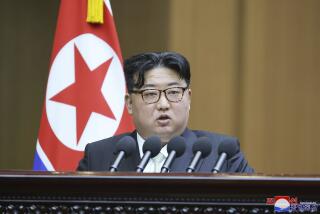N. Korean Move Spurs Hopes on Nuclear Issue
- Share via
TOKYO — The abrupt decision by North Korea to return to the negotiating table has raised some hopes that the regime of Kim Jong Il has made a high-level decision to dismantle its nuclear program.
After months of balking, North Korea announced Tuesday through its official news service that it would attend a second round of six-party talks beginning Feb. 25 in Beijing.
“We hope the talks will be successful,” U.S. Secretary of State Colin L. Powell said in Washington when asked about the announcement, which was confirmed by South Korea and China.
“This time we are expecting some progress,” said a South Korean diplomat familiar with negotiations. “North Korea is more open now to the American demand of a complete and verifiable dismantling.”
The diplomat, who asked not to be quoted by name, said the North Koreans have been chastened by Libya’s agreement in December to dismantle its weapons program and by the current investigation into top Pakistani scientist Abdul Qadeer Khan, who allegedly provided North Korea and other nations with key nuclear technology.
The diplomat said the North Koreans are also anxious to reach an agreement before the U.S. presidential election, fearing that a second Bush administration would take a tougher line.
Deputy Secretary of State Richard L. Armitage, who was visiting Tokyo this week, told Japanese television he hoped North Korea would eventually learn from the Libyan experience that “you are not excluded from the international community for having had nuclear weapons; you are excluded for keeping them.”
The first round of six-party talks -- which included the U.S., Russia, China, Japan and the two Koreas -- took place in August in Beijing and ended in frustration. Efforts to schedule additional negotiations collapsed in December after North Korea named conditions for showing up, such as donations of heavy fuel oil and lifting of economic and political sanctions imposed by the United States.
But negotiations have continued furiously behind the scenes, with concessions made on both sides since August. President Bush has said he would offer North Korea a letter of assurance that the U.S. is not planning an invasion. The North Koreans, meanwhile, have dropped the demand that their conditions be met before talks begin. They also appear to be more mindful of the American insistence that they must completely dismantle their nuclear program and readmit weapons inspectors.
“Both sides have made concessions,” said Moon Chung In, a South Korean academic with close ties to his government.
The other parties in the talks have been pushing North Korea and the U.S. to soften their positions.
Diplomatic analysts believe that North Korea is increasingly anxious to strike a deal in order to bring in energy assistance and financial aid.
Eric Heginbotham, an Asia specialist at the Council on Foreign Relations, said he has spoken with Asian diplomats who believe the North Koreans are more willing to negotiate and added he has seen signs that the Bush administration is also more flexible.
“My level of confidence that there will be some progress is higher than it was a year ago, or even six months ago. But I do think this will take a while,” he said.
“The North Koreans are getting weaker. They can’t stand it any longer. They feel they have to make a deal,” said Toshio Miyatsuka, a Japanese expert on North Korea at Yamanashi Gakuin University.
One potential stumbling block in the talks is likely to be North Korea’s demand for financial assistance in return for a freeze in its nuclear effort, while the Bush administration has said there should be no rewards until the program is dismantled.
“We’re not going to pay again for something that’s been promised in the past and then violated,” State Department spokesman Richard Boucher said Tuesday, referring to a deal the U.S. struck with North Korea in 1994.
Another looming problem is the U.S. position that any deal must cover not only North Korea’s nuclear reactor and plutonium-reprocessing facilities but a clandestine program to produce highly enriched uranium. Last month, North Korea denied to a private U.S. delegation that it ever had such a program, but U.S. officials have said they have strong evidence to the contrary.
“Not all will be solved in this second round of talks, but we expect more detailed, technical negotiations to take place,” Deputy Foreign Minister Lee Soo Hyuck of South Korea said Tuesday.
Times staff writer Paul Richter in Washington contributed to this report.
More to Read
Sign up for Essential California
The most important California stories and recommendations in your inbox every morning.
You may occasionally receive promotional content from the Los Angeles Times.













